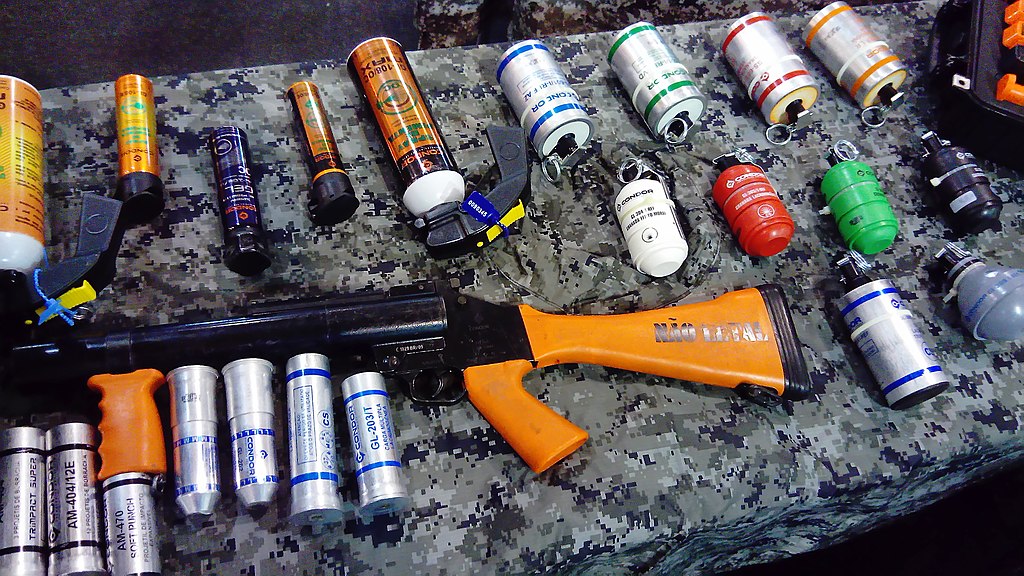
The Peruvian National Police bought almost 30,000 tear gas canisters on December 20, 2022, still under the Bolsonaro government, at a cost of almost 500,000 dollars from the Brazilian company Condor. They turned themselves in on January 14, in yet another case of complicity between the new Lula government and the coup government of Dina Boluarte, which has already left more than 65 dead. The weapons are intended to repress the peasants and workers who are rising up throughout Peru against a government established through a parliamentary coup in favor of the interests of large foreign mining companies, demanding an end to the repression, the resignation of Boluarte and of Parliament, and a Constituent Assembly that puts an end to the legacy of the Fujimori dictatorship.
This is one more example of Lula’s support for Dina Boluarte, which materializes with the recognition of her government, close relations and the release of ammunition exports for the repression of the Peruvian people. A position aligned with the policy of North American imperialism, whose historical objective is to deepen the exploitation and oppression of the working class and the oppressed peoples of Latin America. In this sense, the history of collaboration of the Brazilian State with the growing international industry of repression of the civilian masses, arming capitalist regimes against the uprisings of the exploited, is repugnant. An industry that drags a record of deaths while demagogy with human rights as a marketing strategy.
Condor, based in Nova Iguaçu, near Rio de Janeiro, is the only Brazilian manufacturer of this type of product and one of the ten largest in the world. Despite being 100% privately owned, it is considered a “strategic Brazilian defense company”, being a monopoly that supplies weapons to all the country’s police forces and the Armed Forces, guaranteeing the supply of “non-lethal” weapons such as gas tear gas, pepper spray, rubber bullets, etc. In the words of Bolsonaro’s former Ministry of Defense, “promoting Condor’s business is part of a ‘strategic objective’ of the Brazilian government”, an aspect shared by Lula’s Workers’ Party both in his past administrations and today. According to data from the same ministry, the arms sector in Brazil employs “some 40,000 people and bills 1,000 million reais (213 million dollars) a year.”
The president of Condor, Carlos Erane de Aguiar, has a vast activity in business summits: he was a member of the Council for Economic and Social Development of the Bolsonaro Presidency, director of the Department of Defense and Security of the Industrial Federation of the State of São Paulo (FIESP), member of the plenary session and vice president of the Council of the Industrial Center of Rio de Janeiro (CIRJ/Firjan) and president of the Firjan Regional Representation in Baixada Fluminense. His company has been growing in the repression market under a discourse of ethics, social responsibility, respect for the environment and human rights, affirming appreciation for life and that its products prevent the use of firearms by the police forces around the world.

However, the reality of this type of weaponry is different, as evidenced by the record of deaths from projectiles, suffocation, cardiac arrest from stun weapons and the countless mutilated in the protests of the last decade, such as the Arab Spring, the Yellow Vests in France, the uprisings in Chile and now in Peru, among others. Meanwhile, Condor washes his hands of it stating that he bears no responsibility for the “misuse” of his products. The pacifist mask also falls when we consult the profile of one of Condor’s parallel companies, Welser Itage, on the Federal Government’s Open Data Portal, which shows that it also supplies 30 and 120-caliber firearms, caliber ammunition up to 30, 120 and 125 and over 75 millimeters, as well as bombs, grenades, rocket engines and components, and even boxes, containers and special packaging for nuclear weapons and ammunition. An authentic death market that, to guarantee its sales in times of capitalist crisis and social upheaval, washes the face of its companies.
To get an idea of the figures at stake in this market, according to the Current Brazil Networkin the article “Antimotim Agents: The Case for Pro-Regulation”, Professor Anna Feigenbaum lists that in 2014, Condor earned 50 million dollars in the international market. And that during the World Cup in Brazil, that same year, he earned 22 million dollars. Condor was among the ten companies that received the most funds from the then Extraordinary Secretariat of Security for Large Events (Sesge), of former President Dilma Rousseff’s Ministry of Justice, between 2012 and 2015: more than 43.5 million reais, according to the researcher Bruno Cardoso, one of the authors of the book “Technopolitics of Surveillance”. And ensuring the negotiated hand in hand with Bolsonaro, in 2020, Cóndor achieved in the Chamber of Foreign Commerce the exclusion of an export tax that fell on several of its products that pose a risk to human life.
On a global scale, the prospects, according to the consultancy Markets and Markets, suggest that this “non-lethal” ammunition business will reach 1,106 million dollars in 2023, driven by the militarization of police forces and the increase in “political disputes and civil unrest.” Yet Condor’s colossal profits have already served to suppress the revolts of the past two decades.
Founded in 1985 on a former supplier of land mines to the Brazilian Army, Condor became the first specialized manufacturer of “non-lethal” weapons to be established in Brazil. In 2002, a watershed according to the company itself, it exported for the first time, commissioned by the Brazilian Army, for a peacekeeping mission of the UN in Algeria. In 2009 it became a supplier to the UN with the Soft Punch AM-470 mass impact projectile, the type responsible for eye mutilations. Since then it has been the only Latin American company invited by NATO to the event North American Technology Demonstration, organized jointly with the Non-Lethal Weapons Program of the US Department of Defense, has opened offices in Singapore and Abu Dhabi, and has more than 80 agents and representatives around the world. Today it exports to more than 50 countries and more than half of its production, of 120 catalog items, is exported, under industrial secrecy, mainly to Africa and the Middle East.
With the Arab Spring that began in 2011, Condor shows the world the repressive power of its production, supplying countries like Turkey, Tunisia and Bahrain -where it has its first big scandals due to the murderous repression of the police who carried their weapons-. During the crackdown on the revolt against King Hamad Al Khalifa in Bahrain, at least 38 people, including babies, were reportedly killed by Condor gas, released in clouds that invaded entire neighborhoods.
Shortly before the start of the 2013 protests in Turkey against Erdogan, where they were widely used, the Brazilian PT government supported a meeting of national arms companies with foreign buyers in the capital, Istanbul. On that occasion, the Brazilian Agency for the Promotion of Exports and Investments (Apex) and the Brazilian Association of Defense and Security Materials Industries (Abimde) -whose then vice president, Carlos Frederico Queiroz de Aguiar, was president of Condor- negotiated the numerous projectiles, grenades and sprays that would be used a few weeks later against the working youth who took to the streets.
This international experience also preceded the ostensible use of Condor materials in the repression of the June 2013 riots in Brazil, when the capitalist crisis and the country’s structural demands, unmet by more than a decade of PT governments, included Brazil in the map of the revolts, together with the Arab Spring, the Indignados of the Spanish State or the Occupy Wall Street movement in the United States. Among the victims, let us remember the street cleaner Cleonice Vieira de Moraes, a 54-year-old woman who died on June 21, 2013 after inhaling tear gas during a demonstration in the city of Belém. And as a survey by a group of media outlets showed, in Brazil, in 2017 alone, there were 13 deaths and ten serious injuries from this type of weapon.
Venezuela is also a valued Condor customer: Between 2008 and 2011, Maduro purchased at least $6.5 million worth of tear gas and rubber bullets. In 2017, during a wave of repression that left dozens dead -such as the student Juan Pernalete, who died after being hit in the heart by a tear gas canister fired a few meters away-, stocks ran out and a new purchase of 70,000 Condor bombs, later blocked by the Temer Ministry of Defense.
More recently, the data also shows sales to Ecuador (4.1 million dollars), Colombia (1.8 million) and Chile (1.5 million) between 2020 and 2021, the same period in which these countries experienced intense protests. social. In Sudan (Africa), during the protests against the military coup in 2021, humanitarian monitoring organizations reported that most of the injuries in the days were due to tear gas projectiles, 471 due to suffocation and 537 due to wounds and mutilations by direct impact of projectiles, many of them from Condor, which also caused several deaths in the country.
Faced with a history of millionaire profits promoting atrocities inside and outside the country, it is necessary that, here in Brazil, the working class, youth, women, blacks, indigenous people and LGBT raise the strongest solidarity with the Peruvian people and a fight for the end of the relations of the new government with the coup government of Boluarte, as well as for the end of the export of ammunition and arms to repress the struggles of the working class and the poor people of other countries.
Source: www.laizquierdadiario.com

